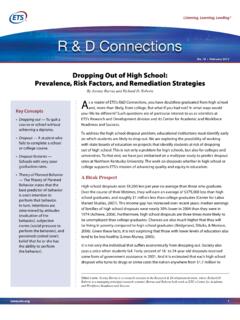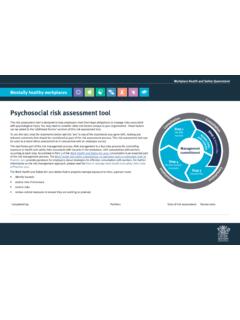Transcription of RISKS TO MENTAL HEALTH: AN OVERVIEW OF …
1 RISKS TO MENTAL health : AN OVERVIEW OF VULNERABILITIES AND RISK factors BACKGROUND PAPER BY WHO SECRETARIAT FOR THE DEVELOPMENT OF A COMPREHENSIVE MENTAL health ACTION PLAN 27 AUGUST 2012 This WHO Discussion Paper does not represent an official position of WHO (please refer to the disclaimer included on the last page of this paper). RISKS to MENTAL health Page 2 RISKS to MENTAL health : an OVERVIEW of vulnerabilities and risk factors Background paper by WHO secretariat for the development of a comprehensive MENTAL health action plan 27 August 2012 _____ Key points The value of MENTAL health and well-being: MENTAL well-being makes up an integral part of an individual's capacity to lead a fulfilling life, including the ability to form relationships, study, work or pursue leisure interests, as well as to make day-to-day decisions and choices. Determinants of MENTAL health and well-being: MENTAL health and well-being is influenced not only by individual attributes, but also by the social circumstances in which persons find themselves and the environment in which they live; these determinants interact with each other dynamically, and may threaten or protect an individual s MENTAL health state.
2 RISKS to MENTAL health over the life course: RISKS to MENTAL health manifest themselves at all stages in life. Taking a life-course perspective shows how risk exposures in the formative stages of life including substance use in pregnancy, insecure attachment in infancy or family violence in childhood - can affect MENTAL well-being or predispose towards MENTAL disorder many years or even decades later. Vulnerability to MENTAL disorders: Depending on the local context, certain groups in society may be particularly susceptible to experiencing MENTAL health problems, including households living in poverty, people with chronic health conditions, minority groups, and persons exposed to and/or displaced by war or conflict. Vulnerability among persons with MENTAL disorders: Person with a MENTAL disorder have their own set of vulnerabilities and RISKS , including an increased likelihood of experiencing disability and premature mortality, stigma and discrimination, social exclusion and impoverishment.
3 MENTAL health promotion and protection: Since the range of RISKS to MENTAL health is wide, responses to them need to be multi-layered and multi-sectoral. Broad strategies include: nurturing of core individual attributes in the formative stages of life (such as self-esteem and resilience); early recognition and prevention of emotional or behavioural problems, especially in childhood and adolescence; provision of living and working conditions that enable psychosocial development and self-determination (particularly among vulnerable persons); promotion of positive interactions within and between social groups; social protection for the poor; anti-discrimination laws and campaigns; and promotion of the rights, opportunities and care of individuals with MENTAL disorders. RISKS to MENTAL health Page 3 1. Context, objectives and scope MENTAL health or psychological well-being makes up an integral part of an individual's capacity to lead a fulfilling life, including the ability to form and maintain relationships, to study, work or pursue leisure interests, and to make day-to-day decisions about educational, employment, housing or other choices.
4 Disturbances to an individual's MENTAL well-being can adversely compromise these capacities and choices, leading not only to diminished functioning at the individual level but also broader welfare losses at the household and societal level. In the context of national efforts to develop and implement MENTAL health policy, it is vital to not only address the needs of persons with defined MENTAL disorders, but also protect and promote the MENTAL well-being of its citizens. The intrinsic value of positive MENTAL health is enshrined in WHO s definition of health as .. a state of complete physical, MENTAL and social well-being and not merely the absence of disease or infirmity .1 At its Sixty-fifth session, held in May 2012, the World health Assembly adopted a resolution calling on WHO to develop, in consultation with Member States, a comprehensive action plan that actively addresses not only the need for early identification and appropriate care for persons with MENTAL disorders, but also assesses vulnerabilities and RISKS as a basis for developing the MENTAL health plan.
5 As a background input to the preparation of a comprehensive MENTAL health action plan by WHO Member States and secretariat, this paper sets out to provide a conceptual outline of the main vulnerabilities and risk factors relating to MENTAL health and ill- health , as well as an OVERVIEW of the available evidence for mitigating RISKS through appropriate promotion and protection efforts. The focus is on the set of vulnerabilities and risk factors that should be taken into account when developing and implementing appropriate health and social policies or strategies. In reviewing the contribution and interaction of different determinants to MENTAL health and well-being, not only their adverse but also their protective influences are considered. 2. Determinants of MENTAL health and well-being A commonly used definition of MENTAL health is .. a state of well-being in which the individual realizes his or her own abilities, can cope with the normal stresses of life, can work productively and fruitfully, and is able to make a contribution to his or her community.
6 2 Reference to this definition makes it clear that MENTAL or psychological well-being is influenced not only by individual characteristics or attributes, but also by the socioeconomic circumstances in which persons find themselves and the broader environment in which they live (Figure 1): Individual attributes and behaviours: These relate to a person's innate as well as learned ability to deal with thoughts and feelings and to manage him/herself in daily life ('emotional intelligence'), as well as the capacity to deal with the social world around by partaking in social activities, taking responsibilities or respecting the views of others ('social intelligence'). An individual s MENTAL health state can also be influenced by genetic and biological factors ; that is, determinants that persons are born or endowed with, including chromosomal abnormalities ( Down's syndrome) and intellectual disability caused by prenatal exposure to alcohol or oxygen deprivation at birth.
7 RISKS to MENTAL health Page 4 Social and economic circumstances: The capacity for an individual to develop and flourish is deeply influenced by their immediate social surroundings including their opportunity to engage positively with family members, friends or colleagues, and earn a living for themselves and their families and also by the socio-economic circumstances in which they find themselves. Restricted or lost opportunities to gain an education and income are especially pertinent socio-economic factors . Environmental factors : The wider sociocultural and geopolitical environment in which people live can also affect an individual s, household s or community s MENTAL health status, including levels of access to basic commodities and services (water, essential health services, the rule of law), exposure to predominating cultural beliefs, attitudes or practices, as well as by social and economic policies formed at the national level; for example, the on-going global financial crisis is expected to have significant MENTAL health consequences, including increased rates of suicide and harmful alcohol Discrimination, social or gender inequality and conflict are examples of adverse structural determinants of MENTAL well-being.
8 Figure 1 Contributing factors to MENTAL health and well-being It is important to emphasize that these different determinants interact with each other in a dynamic way, and that they can work for or against a particular individual s MENTAL health state. Table 1 provides an illustrative set of factors that may threaten or protect MENTAL health . For example, an individual s level of self-worth could be enhanced or diminished depending on social support or economic security at the household level, which in turn might be influenced by the extent of political stability, social justice or economic growth in a country. MENTAL health and well-being Individual attributes and behaviours Social and economic circumstances Environmental factors RISKS to MENTAL health Page 5 Table 1 MENTAL health determinants Level Adverse factors Protective factors Low self-esteem Self-esteem, confidence Individual attributes Cognitive/emotional immaturity Ability to solve problems and manage stress or adversity Difficulties in communicating Communication skills Medical illness, substance use Physical health , fitness Loneliness, bereavement Social support of family & friends Neglect, family conflict Good parenting / family interaction Social Exposure to violence/abuse Physical security and safety circumstances Low income and poverty Economic security Difficulties or failure at school Scholastic achievement Work stress.
9 Unemployment Satisfaction and success at work Poor access to basic services Equality of access to basic services Environmental Injustice and discrimination Social justice, tolerance, integration factors Social and gender inequalities Exposure to war or disaster Social and gender equality Physical security and safety 3. RISKS to MENTAL health A further critical way in which RISKS to MENTAL health interact is over age and time. RISKS to MENTAL health manifest themselves at all stages in life. A life-course approach is used here, since it shows how risk exposures in the formative stages of life can affect MENTAL well-being many years or even decades 5 6 Figure 2 presents a schematic OVERVIEW of some of the main individual, social and environmental RISKS presenting themselves over the life course. Alternative approaches or perspectives could be taken (such as using gender, socioeconomic status or income rather than age group as the primary unit of interest).
10 It is also the case that not all RISKS pertain to a particular age group; for example, gender, ethnicity and place of residence are independent of age; these are also discussed below. Pre-conception and pre-natal period: An individual s MENTAL health can be influenced by events or circumstances occurring before their birth or even their conception. Pregnancies that are unwanted or take place during adolescence, for instance, can raise the chance of risky health behaviours in pregnancy or MENTAL health problems in Likewise, poor adaptation to pregnancy can be considered a potential risk to the child s MENTAL as well as physical health It is already well established that malnutrition, low birth weight and certain micronutrient deficiencies (such as iodine deficiency) significantly heighten the risk to brain development, as do risky health behaviours in pregnancy, especially the use of tobacco, alcohol and drugs.


















